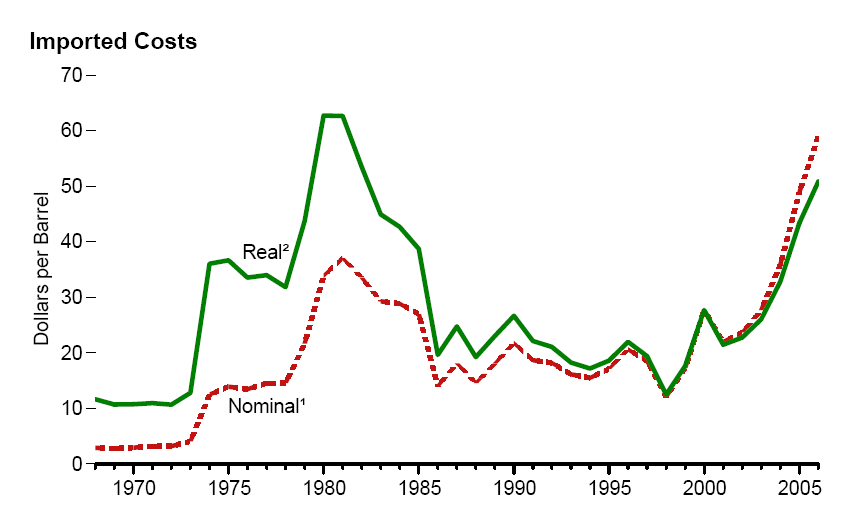In part, it's why the Inflation Reduction Act was passed.
I have nothing else to add to this non-political debate.

All: thanks for the respectful back and forth. Looking forward to continuing to enjoy (most) of the content in this site!

In part, it's why the Inflation Reduction Act was passed.


I really don't see how it is so hard to just not engage in stuff you don't like. It's kind of like having Netflix, you don't watch every single movie that comes up.I disagree. It's political. We may not get to see eye to eye on this one.
For sure, it's a compound problem in which the Fed, prior tax cuts, budget overages, tariffs, and pandemic supply chain issues, all have a heavy hand. Unfortunately, many companies are using it as cover for "adjusting" prices when in fact they are using inflation as cover for serious increases in the company coffers.I wish I could be reading more debate on the topic of the OP, than debate on whether It qualifies as “political” or not.
Corporate greed is surely one component contributing to inflation, but I think the debatable point is what fraction of the sum can be attributed to this one factor, versus many others. People who write stories make their money on earning the most clicks, not on actually being correct in their conclusions.
They may only allow 1-3? free reads. Try deleting the WSJ cookie from the computer. I can not post the whole article here without a copyright violation.
It was evident to all that oil company greed was and is a driver of inflation. That affected transportation, the delivery of goods, heating, and electricity costs. There is no doubt that every major oil company has reported phenomenal, record-shattering profits in the past 2 yrs. This is not all new news. Booming corporate profits were starting to be reported last year at this time. In part, it's why the Inflation Reduction Act was passed. The WSJ article just updates this assumption with updated earnings reports that show that this was indeed absolutely correct. It's notable that this is now coming from the WSJ.

Companies are pocketing their fattest profits in more than 70 years, even as they complain about inflation
Companies aren't just raising prices enough to cover rising costs from inflation, they're padding their margins on top.www.businessinsider.com

It's not just inflation — corporate greed is also partially to blame for the rising prices you're paying
Starbucks blamed labor costs and supply shortages for higher prices — all while increasing their CEO's pay by 40% to $20 million.www.businessinsider.com
Yes they had a year and a half of lower than normal profits (but not losses like many other industries) but 2022 was their most profitable year ever. So I'm sorry but I don't feel bad for them. Especially since my tax dollars are spent to subsidize those very profitable companies.In 2020 and early 2021, oil company profits were, on average, <5% (some were at negative numbers, some were as high as 10%). Companies cannot survive on <5% profit long term. In 2022, the prices at the pumps went down (which no one complained about - except in general because everyone bitches that gas isn't $0.35 like back in the early 80's.
However, when trying to push an agenda, news articles and politicians talk in dollar amounts, not percentages. Talking $$ amounts is not productive since as inflation rises, the net $$ that a company makes goes up even if their profit margin stays exactly the same. Go take a look at the profit percentages of pharma, utilities, communications, materials etc. Those profit margins were in the 20's in 2021 when oil companies were taking a hit. Every comapny I have worked for in the last 25 years has targeted at least 30% profit. The only reason to stay in business is to make money.
Once again, ain't saying greed ain't a thing, just pointing out that it isn't all balck and white and you can't beleive anything you here for the news or the gov. There are two sides to every story and somewhere in between is usually the truth.
Yes they had a year and a half of lower than normal profits (but not losses like many other industries) but 2022 was their most profitable year ever. So I'm sorry but I don't feel bad for them. Especially since my tax dollars are spent to subsidize those very profitable companies.
The actual number varies allot and the reports are all over the place but most reliable sources place it at around 20 billion in 2022. This is for an industry that profited almost 220 billion in 2022. About 2 trillion on military. So yes we over spend on military as well. But why are we subsidizing the oil and gas industry?And exactly how many of your tax dollars go to the oil and gas industries in the form of subsidies?
Everyone sure likes to use that as a talking point on here, so what's the dollar value? I've done the math and want you to as well. Then compare that to US military spending.
Not that it makes the point more validated or not, but tons of places are talking about this profiteering. Most corporations have been posting record profits since 2020. I don't think anyone is placing the blame for this on small businesses, but it's pretty clear that when the prices for goods across the boards goes up and the biggest companies make record profits that there is a problem.I wish I could be reading more debate on the topic of the OP, than debate on whether It qualifies as “political” or not.
Corporate greed is surely one component contributing to inflation, but I think the debatable point is what fraction of the sum can be attributed to this one factor, versus many others. People who write stories make their money on earning the most clicks, not on actually being correct in their conclusions, so it’s hard to take the conclusions of any one author or article at face value.
Given the number of talking heads out there today, very few of us have the bandwidth to track the credibility of any one author. This has all but eliminated any incentive for them to build credibility by consistent even-handed reporting, favoring instead the clickbait that earns short-term gains.
I'm not sure why this comparison matters. While I agree that DoD spending is too high, the same DoD is what gives the dollar any tooth. I think we could all agree that the fossil majors don't need a handout and agree that the DoD gets too much money. Not sure why having a plump DoD somehow negates that BHoller is upset about FF subs.And exactly how many of your tax dollars go to the oil and gas industries in the form of subsidies?
Everyone sure likes to use that as a talking point on here, so what's the dollar value? I've done the math and want you to as well. Then compare that to US military spending.
Bite your tongue! I've made a good living on your military spending....we over spend on military as well.

Oh without a doubt allot of things we use every day have come from military spending. But there is absolutely lots of room for spending cuts in that (and most other areas)Bite your tongue! I've made a good living on your military spending.
FWIW, that military spending has generated hardware and software that is now directed toward detection of tornados at night, and countless other life-saving technologies. Even things as ubiquitous as your car's forward-looking radar, and if you go back a bit farther... GPS. One of my largest projects at the moment is a component in a weather radar system, which relies very heavily on tech that was originally developed for military and space applications.
I'd be hard-pressed to find as many or as obvious benefits reaped from oil subsidies as we've seen from military, but perhaps when scaled at the ratio of 20 billion versus 2 trillion, arguments could be made for a similar cost/benefit ratio.
The actual number varies allot and the reports are all over the place but most reliable sources place it at around 20 billion in 2022. This is for an industry that profited almost 220 billion in 2022. About 2 trillion on military. So yes we over spend on military as well. But why are we subsidizing the oil and gas industry?
I'm not sure why this comparison matters. While I agree that DoD spending is too high, the same DoD is what gives the dollar any tooth. I think we could all agree that the fossil majors don't need a handout and agree that the DoD gets too much money. Not sure why having a plump DoD somehow negates that BHoller is upset about FF subs.
How is helping to increase the profits of oil and gas companies essential to national security?Both are essential to the national security of the US could be the comparison.
More a comparison though of the cost of government expenses. The US military budget is 125 times that of fossil fuel subsidies.
How is helping to increase the profits of oil and gas companies essential to national security?

Ok but if they are profiting 220 billion why do they need subsidies tax breaks etc? Absolutely if there was danger of a collapse. But that isn't the case at allOne example:

1970s energy crisis - Wikipedia
en.wikipedia.org
Like it or not, the US cannot in any way shape or form afford to take cuts to domestic energy production.
Ok but if they are profiting 220 billion why do they need subsidies tax breaks etc? Absolutely if there was danger of a collapse. But that isn't the case at all
Ok but domestic oil production went up that whole time. Why should our government be propping up businesses who can't survive on their own when they have absolutely no bearing on national security? Who is coming to save me if my cash flow is negative?One good year doesn't make up for a decade of poor performance. 2015, 2016, and 2017 bankrupted 100's of junior oil companies, particularly those operating in the oil shales.
2022 was a good year, 2023 won't be as good though. Some Oil Shale wells have a breakeven of over $60/barrel. Won't take much of a drop in oil price to return some producers to a negative cashflow situation.
Ultimately it doesn't much matter to me, it's not my tax dollars, and every drop of oil the US doesn't produce is another one we can sell to you.
True that. It points out how obscene recent earnings reports of record profits are.Why are we only talking about recent profits, but policy from the 70's? The oil companies have been making money hand over fist for decades. Let's not make this into a pity party for the people responsible for a lion's share of the environmental damage over the last century and a half.
Let's not make this into a pity party for the people responsible for a lion's share of the environmental damage over the last century and a half.
We use essential cookies to make this site work, and optional cookies to enhance your experience.

